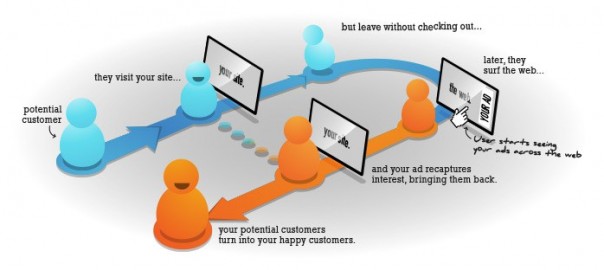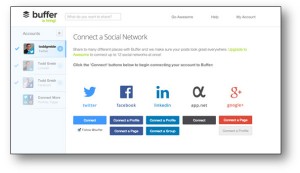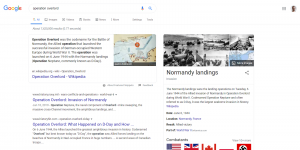Wouldn’t it be wonderful if each and every single visitor to your website slipped easily down the sales funnel and converted 100% of the time?
Well, yes it would. But, unfortunately, the marketing world, for all of its best efforts, has yet to discover the magical wand, potion or spell that can achieve this – perhaps such things only exist in Narnia.
Indeed, it may perhaps be a rather sobering statistic to learn, dear Sons of Adam and Daughters of Eve (especially so soon after New Years) that for most websites, only a mere 2-5% of traffic converts on the first visit. This means that as much as 98% of the people who visit your website wander away again without taking any further action – and it is towards this significant majority that retargeting forms its focus. This post will let teach you how to get started with Facebook video retargeting.
But first…
What Is Retargeting?
A great question, naturally, at this point. Retargeting – sometimes known as remarketing – is a mode of advertising that basically targets people who have specifically shown interest in your website or social media page before. Put simply, it’s the marketing that is aimed directly at that whopping 98% of visitors who pay you a visit but vanish before making a purchase.
And In Facebook Video Ad Terms?
Of course, here at Shakr we’re all about online video ads, and specifically over the past few weeks we’ve been focussing our attentions on this blog to the Facebook video ad. So, the next question that naturally needs to be answered before we continue is, what is retargeting when it comes to Facebook video ads?
Well, as the wilier amongst you will no doubt have already inferred, retargeting with Facebook Video ads is simply aiming your new content at people who have already watched and engaged with your previous content.
Retargeting. It’s as simple as that.
How To Optimise Your Retargeting Efforts With Facebook Video Ads
To understand retargeting from a Facebook ad perspective, you’ve first got to get to grips with Facebook Custom Audiences.
In essence, custom audiences and retargeting are both one and the same thing. Indeed, here’s how Facebook describes how custom audiences may be used:
“Custom audiences allow advertisers to target their ads to a specific set of people with whom they have already established a relationship on/off Facebook. Audiences can be defined by either email address, phone numbers, names, date of birth, gender, locations, app user IDs, Apple’s Advertising Identifier (IDFA), or Android’s advertising ID or by a combination of rules used to identify users who took specific actions on your website.”
Put simply, custom audiences is Facebook’s very own retargeting tool.

So far, so painless – but how to use it effectively?
Facebook Custom Audiences
First thing’s first with this one – to get started creating your custom audience for your next Facebook video ad campaign, then you first need to install a pixel.

What’s A Pixel?
Good point. Well, retargeting is in fact a cookie-based technology, which uses a simple and small piece of JavaScript (i.e. a ‘pixel’) to ‘follow’ any visitors to your site as they venture off around the web.
ReTargeter.com describes it most succinctly, and indeed includes the following graphic to help illustrate the point:

“You place a small, unobtrusive piece of code on your website (this code is sometimes referred to as a pixel). The code, or pixel, is unnoticeable to your site visitors and won’t affect your site’s performance. Every time a new visitor comes to your site, the code drops an anonymous browser cookie. Later, when your cookied visitors browse the Web, the cookie will let your retargeting provider know when to serve ads, ensuring that your ads are served to only to people who have previously visited your site.”
Retargeting, as you will probably assume, is an extremely valuable tool, simply because it’s far easier and much more effective to try and convert people who already know who you are, trust your brand and have have engaged with your content than it is trying to target those from cold. Another way to look at it is that retargeting gives you a second (or third, fourth or fifth (etc.)) chance to convert those that escaped your best efforts the first time round.
The Facebook Pixel
Here’s what installing a pixel will enable, according to Facebook:
“The Facebook pixel is a piece of JavaScript code for your website that enables you to measure, optimize and build audiences for your ad campaigns. Using the Facebook pixel, you can leverage the actions people take on your website across devices to inform more effective Facebook advertising campaigns. With the Facebook pixel, you can:
Measure cross-device conversions: See how your customers are moving between devices before they convert.
Optimize delivery to people likely to take action: Ensure your ads are being seen by people most likely to take the action you want them to take, like purchase or fill out a form.
Automatically build audiences for website visitors to retarget: Create Custom Audiences for people who take specific actions on your website, like visited a product page, added to cart or purchased a product.”
You can get step-by-step instructions on how to create your Facebook pixel here.
Now What?
Now you need to combine all of the data that you have gathered from your Facebook custom audiences and pixel, analyse it, and use it to very specifically send out your new video content to those that you know have shown an interest in your work before.
But there are some things to bear in mind when you do this:
Things To Remember When Producing Retargeting Content
The secret of retargeting is that you are only advertising to those who have shown interest in your product or company. Therefore, your retargeting audience more or less has an idea of what you do. To capitalise on click-throughs you’ll want to display content for an audience that is further along the sales funnel. For this reason, you could consider using a customer testimonial or even an in-depth product demo on your retargeting landing page. What you don’t want to do is simply replay any sort of ‘introductory’ promo to either your brand or your product, as you already did that bit the first time round.
Digital & Social Articles on Business 2 Community
(137)
Report Post









